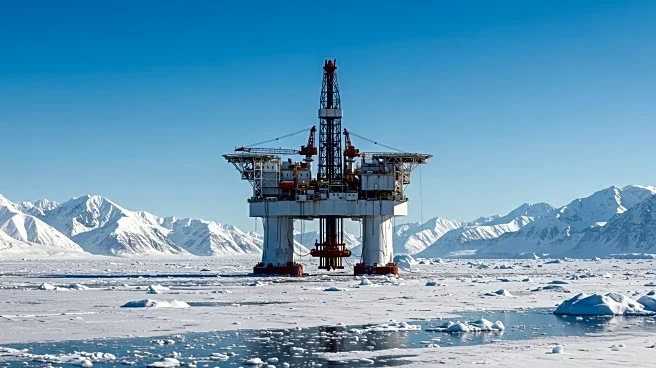What's Happening?
Alaska is witnessing a significant increase in crude oil production due to new developments on the North Slope. The Trans Alaska Pipeline System (TAPS), which has experienced a steady decline since its peak in 1988, is seeing an upswing in daily throughput. Alyeska Pipeline Service Company reported an average of 478,167 barrels per day in May, a notable increase from the 2024 average of 464,784 barrels per day. This rise is largely attributed to ConocoPhillips Alaska's Nuna project, which began contributing oil to the pipeline earlier than anticipated in December 2024. The U.S. Energy Information Administration forecasts that the Nuna and Pikka projects will lead to the first annual production increase since 2017 and the largest since 2002.
Why It's Important?
The increase in oil production in Alaska is significant for both the state and the broader U.S. energy sector. It marks a potential reversal of decades of declining output, which could enhance energy security and reduce reliance on foreign oil imports. The boost in production may also have economic benefits for Alaska, including job creation and increased state revenue from oil taxes. Additionally, the developments could influence national energy policy, as increased domestic production may impact decisions on energy independence and environmental regulations.
What's Next?
The continued development of the Nuna and Pikka projects is expected to further increase oil production in Alaska. Stakeholders, including state officials and energy companies, will likely monitor the impact of these projects on the local economy and environment. There may be discussions on how to balance economic growth with environmental concerns, particularly in light of climate change debates. The success of these projects could also encourage further investment in Alaska's oil industry, potentially leading to more exploration and development initiatives.
Beyond the Headlines
The resurgence in Alaska's oil production raises questions about the long-term sustainability of fossil fuel reliance. While the immediate economic benefits are clear, there are ethical and environmental considerations regarding the impact of increased oil extraction on climate change. The developments may also spark debates on the role of renewable energy sources and the transition to a more sustainable energy future. As Alaska's oil industry evolves, stakeholders will need to address these broader implications to ensure responsible and balanced growth.











